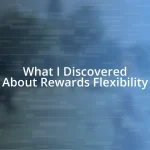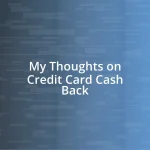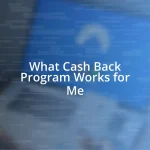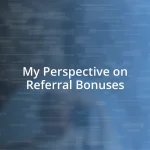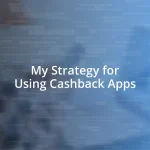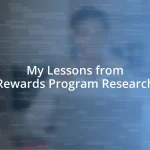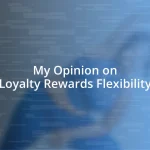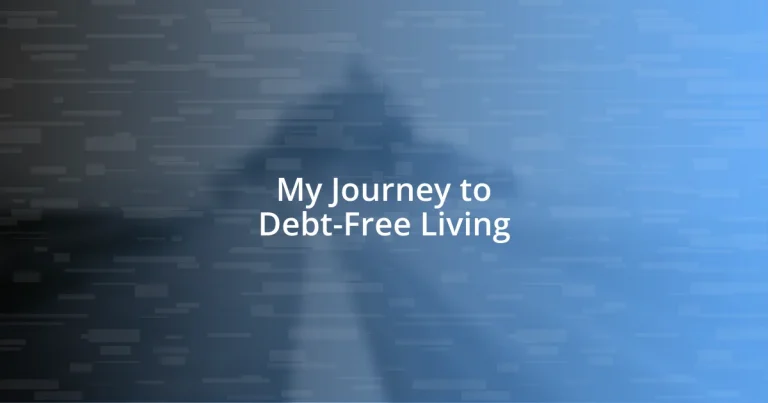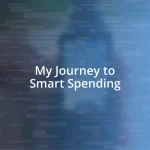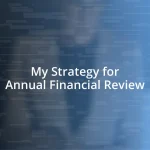Key takeaways:
- Understanding personal debt triggers and emotional spending is essential for regaining financial control.
- Creating a realistic budget plan helps prioritize financial goals and promotes informed spending decisions.
- Maintaining long-term debt-free living involves regular budget reviews, celebrating small victories, and seeking support from like-minded individuals.
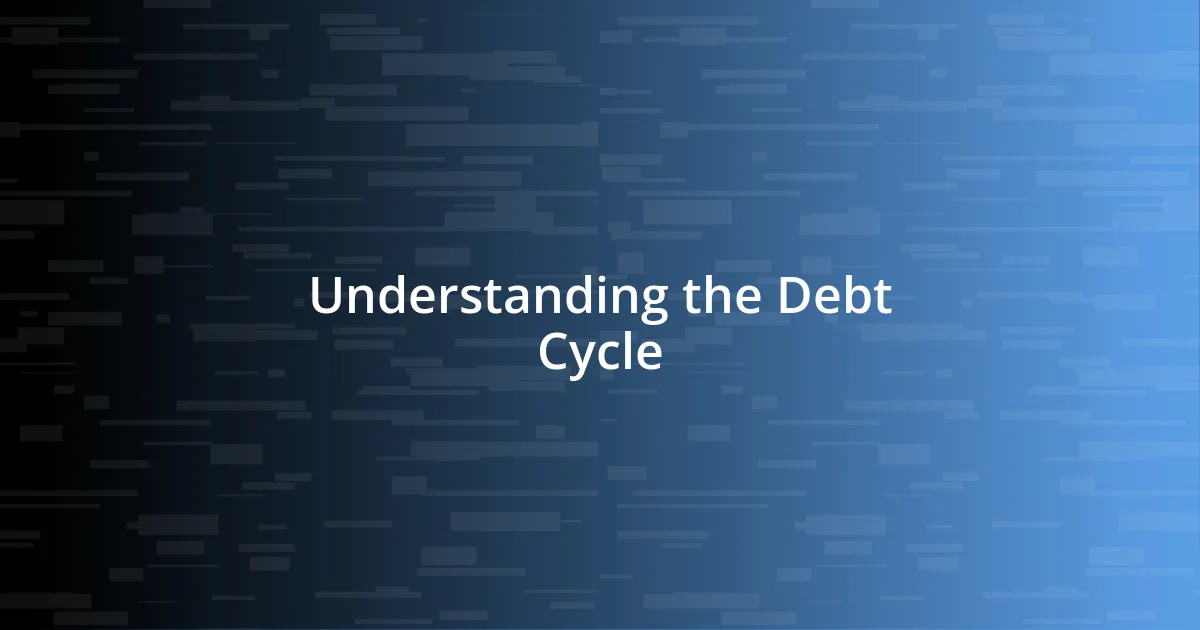
Understanding the Debt Cycle
Understanding the debt cycle is crucial for anyone looking to break free from financial struggles. It often begins with a feeling of urgency—like a sudden bill or an unexpected expense. I still remember the anxiety of that moment when I realized I had to put essential costs on my credit card, thinking it was just a temporary fix. Can you relate to that?
As payments pile up, it becomes a vicious cycle. I found myself making minimum payments, which only seemed to prolong my situation and lead to accumulating interest fees. It was demoralizing watching my balance barely budge while my debt snowballed. Have you ever felt the weight of that burden?
Breaking the cycle takes awareness and determination. I had to confront my spending habits and really evaluate my priorities. This introspection wasn’t easy, but it was necessary for gaining control. Have you taken the time to consider how your own financial patterns contribute to your situation? The moment I realized the need for change was a pivotal step forward in my journey.
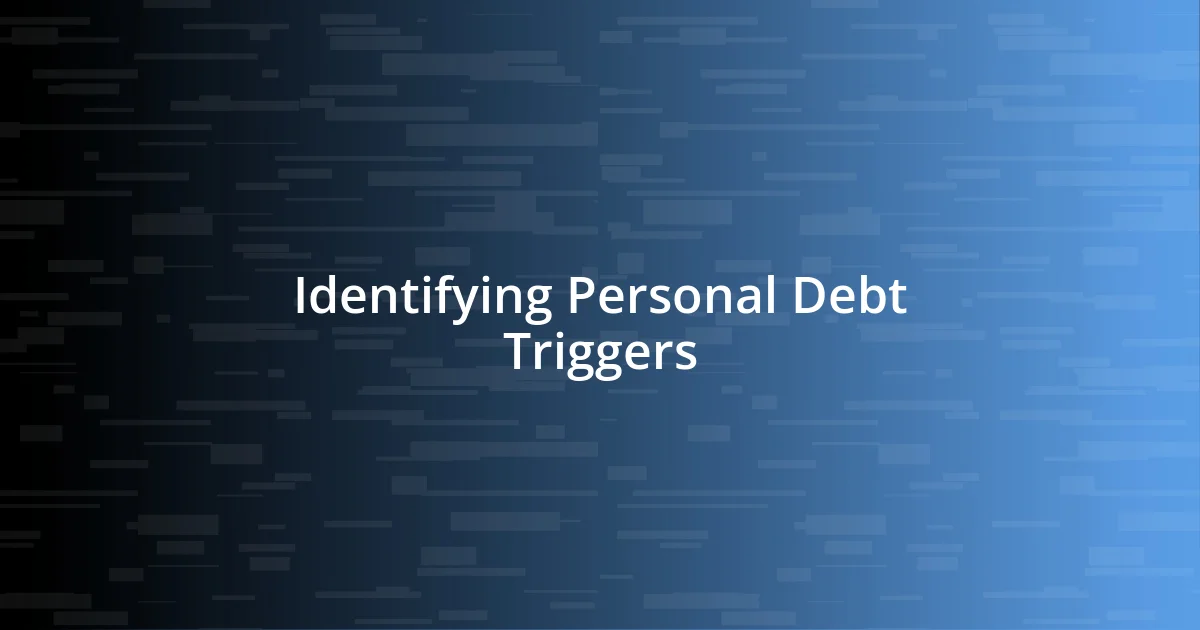
Identifying Personal Debt Triggers
Identifying personal debt triggers is a vital step in regaining control over one’s finances. For me, it was the emotional responses that often led to poor decisions. I distinctly remember one evening after a long, exhausting week at work; I treated myself to an expensive dinner, thinking it would make me feel better. Instead, it contributed to my ever-growing credit card balance. Have you found yourself making similar choices in moments of stress or frustration?
Beyond emotions, external factors like peer pressure and social expectations can also drive unnecessary spending. I’ve noticed that when I was around friends who frequently indulged in lavish experiences, I felt compelled to keep up, even if it meant sacrificing my financial goals. It took time for me to realize that prioritizing my financial health over social acceptance was more fulfilling in the long run. What environments have you found challenging when it comes to managing your spending?
To truly gain insights into your personal debt triggers, consider keeping a spending journal. I started tracking my expenses, categorizing them, and reflecting on the emotional states that preceded unnecessary purchases. This practice unveiled patterns—like shopping whenever I was bored or stressed—that were eye-opening. Identifying these triggers not only empowered me to make better choices but also fostered a deeper understanding of my relationship with money.
| Trigger Type | Personal Reflection |
|---|---|
| Emotional Spending | Treated myself after a tough week, but it led to regret. |
| Social Pressure | Felt the need to keep up with friends, compromising my budget. |
| Habitual Patterns | Realized I shopped out of boredom rather than necessity. |
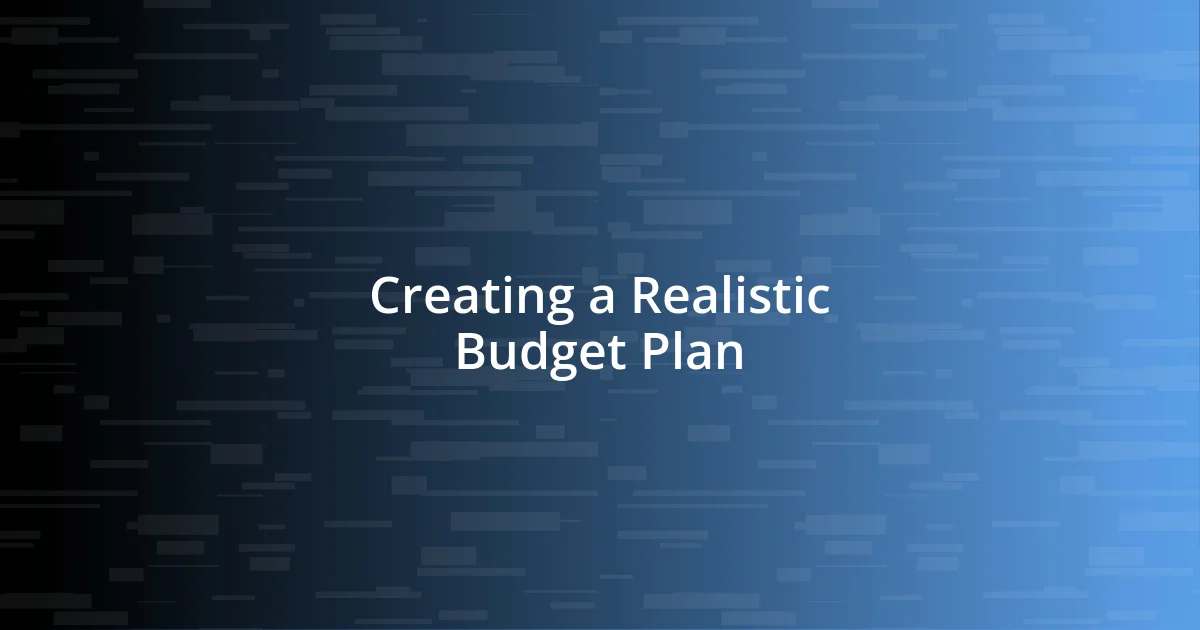
Creating a Realistic Budget Plan
Creating a realistic budget plan is the backbone of achieving debt-free living. When I first navigated this territory, I felt overwhelmed, unsure of where to start. It helped to break my finances into clear categories, making my budget not just a list of numbers, but a genuine reflection of my priorities and goals. I found that focusing on my needs versus wants was essential, helping me make informed choices about where my money was going.
To create your own realistic budget plan, consider these steps:
- List Income Sources: Identify every source of income, from your salary to side gigs.
- Track Fixed Expenses: Write down regular monthly payments like rent, utilities, and insurance.
- Estimate Variable Expenses: Look at previous months to gauge spending on groceries, entertainment, and other categories.
- Set Savings Goals: Allocate a portion of your income for savings, treating it like a regular bill.
- Review and Adjust Monthly: Analyze your budget each month, making adjustments as necessary to enhance your financial discipline.
In my journey, creating a budget felt like a personal roadmap. Initially, every time I checked my budget, I felt a mix of anxiety and hope. But over time, it became empowering to see where my money was going and how I could redirect it towards my goals. It’s the small wins, like paying off a bill or saving a little extra, that kept me motivated. Have you ever experienced that rush of accomplishment when you stick to your plan? It’s invigorating!
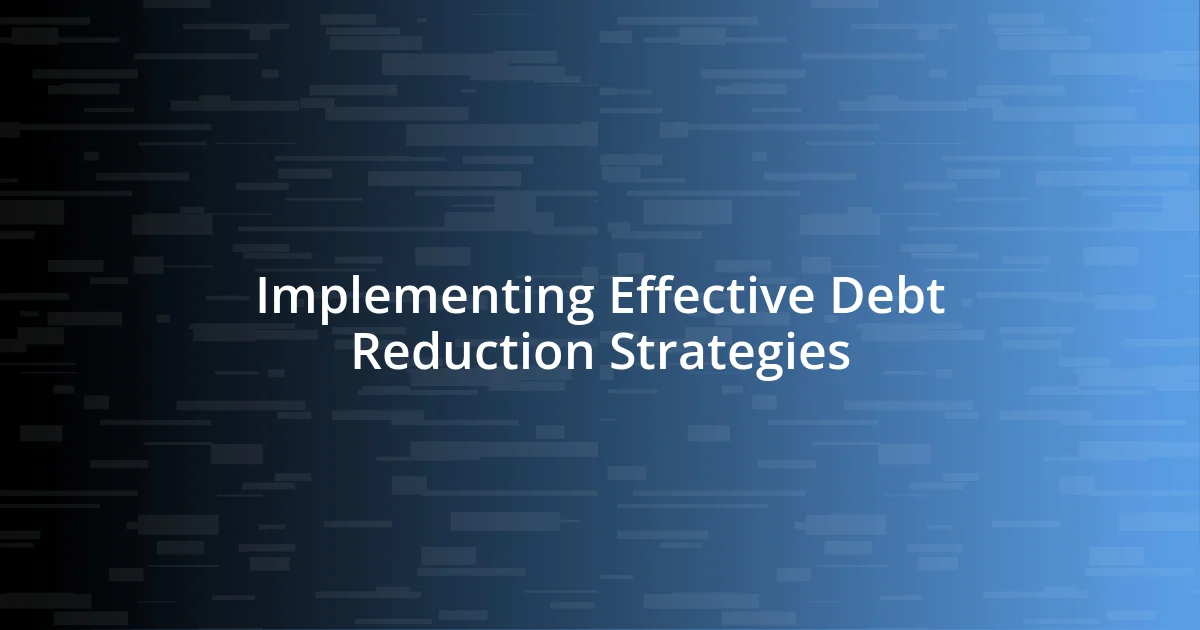
Implementing Effective Debt Reduction Strategies
Implementing effective debt reduction strategies requires a blend of discipline and creativity. One approach that transformed my situation was the snowball method. When I first tried it, I was skeptical but ready to experiment—so I listed my debts from smallest to largest. Paying off the smallest debts first gave me a rush of accomplishment that motivated me to tackle the bigger ones. Have you ever felt the power of those small wins? It’s incredible how quickly the momentum builds!
Another strategy that really made a difference for me was negotiating bills and expenses. I remember calling my cable provider, feeling slightly embarrassed, and asking for any available discounts. To my surprise, they offered me a lower rate without me having to switch providers. I couldn’t help but wonder: why hadn’t I done this sooner? It’s amazing how little conversations like this can lead to significant savings over time, freeing up more money to pay down debt.
Lastly, I discovered the effectiveness of a spending freeze. I set a personal challenge for myself—no non-essential purchases for an entire month. At first, it felt daunting; I questioned if I could resist temptation at coffee shops or during online sales. What I found, though, was liberating. With every day that passed, I built resilience against impulse buys. This practice not only helped me save quickly but also shifted my mindset towards more mindful spending. Have you taken a break from shopping to reset your financial habits? It might just be the wake-up call you didn’t know you needed.
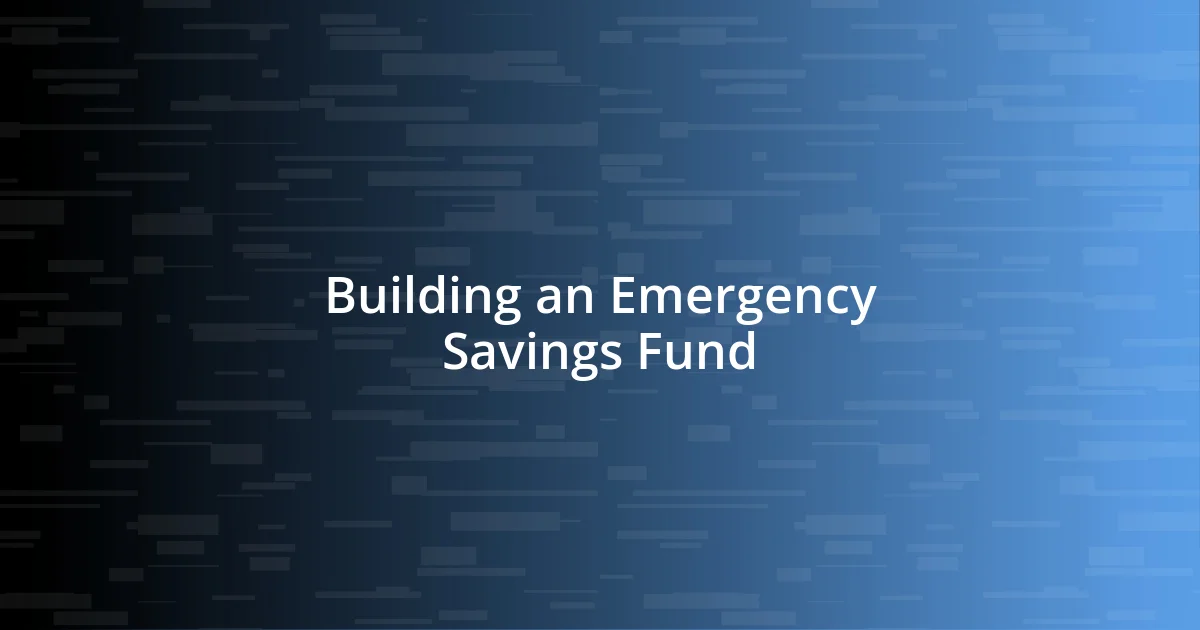
Building an Emergency Savings Fund
Building an emergency savings fund is a crucial step in achieving financial stability. I remember when I first started this journey, I was unsure how to prioritize this in my budget. It felt daunting, but I soon realized that setting aside a little each month could build a safety net that offered peace of mind. Have you ever experienced that reassuring feeling knowing you have a financial cushion? It’s a game-changer!
One effective approach I adopted was the “50/30/20 rule,” where I allocated 20% of my income specifically for savings. Initially, it seemed impossible—could I really save that much? However, by prioritizing this in my budget as a non-negotiable item, I found I could cut back on some discretionary spending without dramatically altering my lifestyle. It’s incredible how small adjustments can lead to significant changes over time.
As I grew more consistent, I started to feel a sense of security I’d never had before. I vividly recall the moment I finally reached my first milestone of $1,000 in savings. The joy was palpable! It made me realize that an emergency fund isn’t just about money; it’s about the freedom to handle life’s unexpected challenges without spiraling into debt. Have you ever thought about how much easier life would feel with a financial safety net? Taking those first steps towards creating that cushion can truly shift your perspective on money and security.
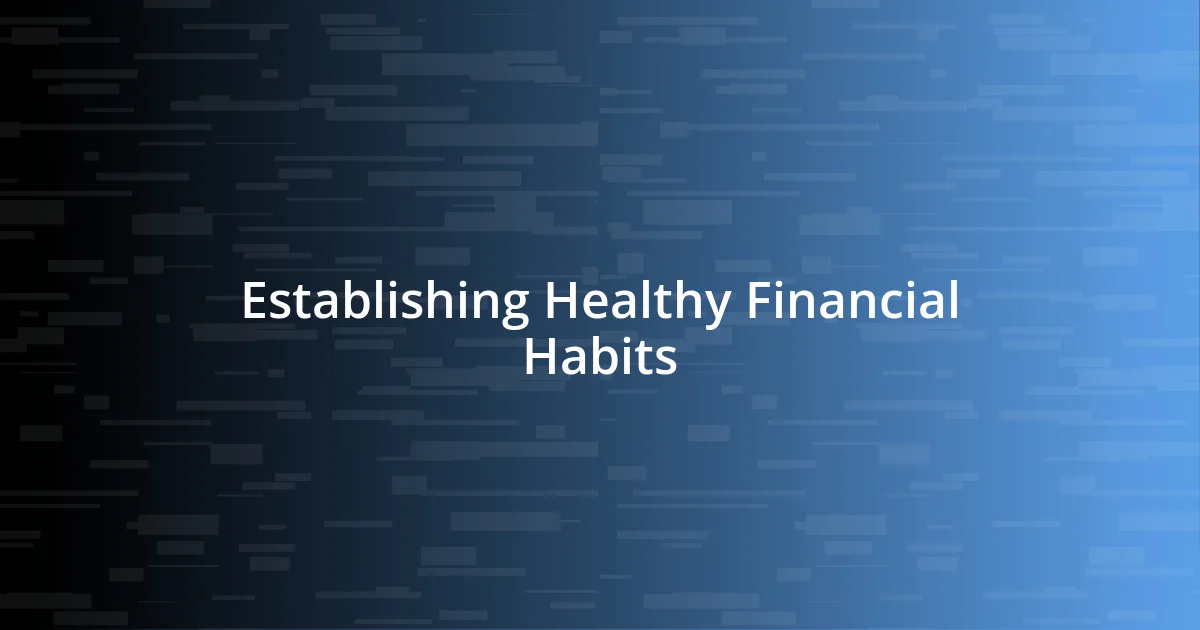
Establishing Healthy Financial Habits
I’ve realized that establishing healthy financial habits is essential to long-term stability. When I began this journey, I decided to track every penny I spent for a month. It felt laborious at first, but I quickly noticed patterns in my spending. I was surprised to see how often I indulged in small treats that added up over time. Have you ever tracked your spending? It can be an eye-opener, showing just where those sneaky expenses creep in!
Another habit that transformed my financial outlook was setting a budget—something I used to resist. Initially, I thought budgeting was too restrictive, like putting my desires in a box. But once I created a simple monthly budget, I found freedom in knowing where my money was going. I could plan for fun while still saving for my goals. Isn’t it freeing to feel in control of your financial choices rather than feeling like they control you?
Finally, automating my savings was a game-changer. I remember setting up a direct debit every payday that funneled a portion into my savings account. It felt weirdly satisfying! I didn’t have to think about it, and before I knew it, the savings stacked up without feeling like a burden. Have you tried automating your savings? It’s like a gentle push toward your goals without any effort on your part—definitely a win-win!
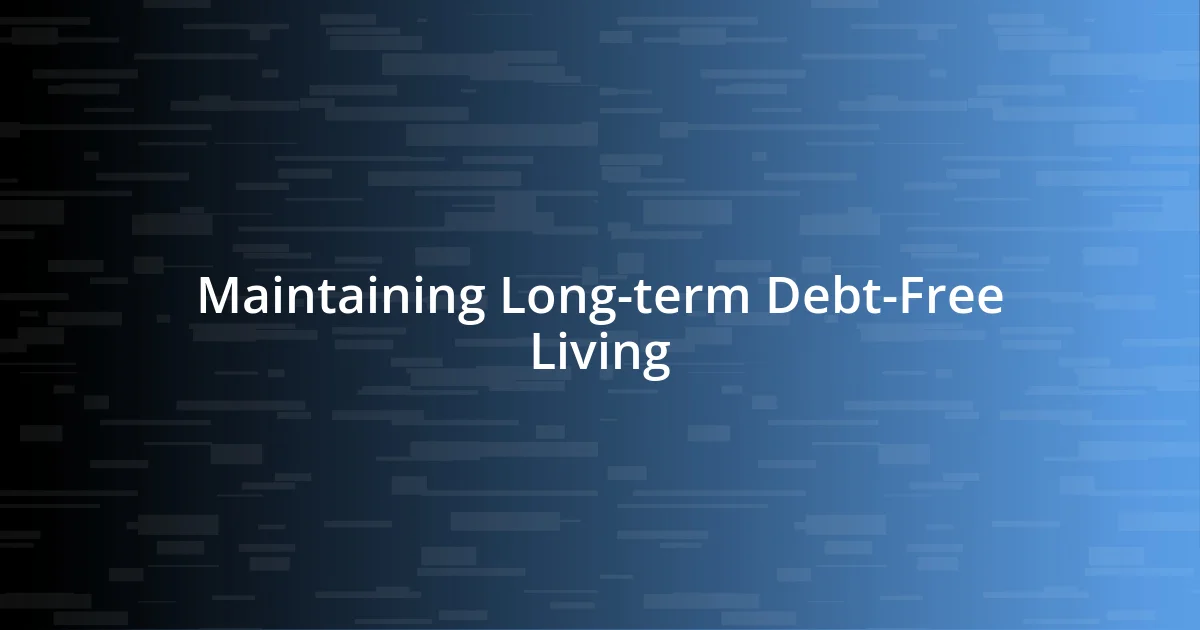
Maintaining Long-term Debt-Free Living
Maintaining a debt-free lifestyle requires a solid strategy and consistent effort. I’ve found that regularly reviewing my budget is vital. Early on, I set aside time each month to reassess my financial goals. It was eye-opening to see how my income, expenses, and savings evolved. Have you ever taken a moment to evaluate your progress? That reflection helps you stay aligned with your goals and adjust as necessary.
To ensure I stick to my debt-free mantra, I often remind myself of the strides I’ve made. There’s something almost empowering about looking back at my financial journey, from the initial struggles to now enjoying the benefits of living debt-free. I make it a point to celebrate small victories along the way, whether it’s treating myself to a day out or indulging in a favorite hobby. After all, don’t we all need a bit of joy amid the hard work?
Additionally, I believe surrounding myself with like-minded individuals has reinforced my commitment. Joining a financial wellness group was a game-changer. Sharing experiences and tips with others helped me stay motivated, and their successes inspired me to remain accountable for my own choices. Have you considered seeking support from your community? It truly makes a difference when you have a team cheering you on in your journey towards sustained financial wellness.

